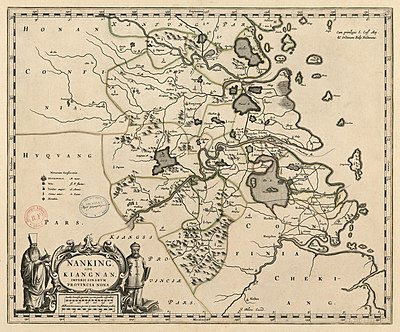| Jiangnan Province | |||||||||
|---|---|---|---|---|---|---|---|---|---|
 Nanking sive Kiangnan ("Nanjing or Jiangnan"), the 9th provincial map of the Chinese Empire in Martino Martini and Joan Blaeu's 1655 Novus Atlas Sinensis ("New Chinese Atlas"). Nanking sive Kiangnan ("Nanjing or Jiangnan"), the 9th provincial map of the Chinese Empire in Martino Martini and Joan Blaeu's 1655 Novus Atlas Sinensis ("New Chinese Atlas"). | |||||||||
| Jiangnan Province | |||||||||
| Chinese | 江南省 | ||||||||
| Literal meaning | Province South of the [Yangtze] River | ||||||||
| |||||||||
| Nanjing Province | |||||||||
| Chinese | 南京省 | ||||||||
| Literal meaning | Province of the [Former] Southern Capital | ||||||||
| |||||||||
Jiangnan, formerly romanized as Kiangnan, was a historical province of the early Qing dynasty of China. Its capital was Jiangning (now Nanjing), from which it is sometimes known as Nanjing or Nanking Province. Established in 1645 during the Qing conquest of Ming, it administered the area of the earlier Ming province of Nanzhili, reaching from north of the Huai River—at the time the course of the Yellow River—to south of the Yangtze River in East China. Its territory was later divided into the separate provinces of Jiangsu and Anhui during the reign of the Qianlong Emperor (1736–1795), although the exact timing is disputed, with Jean-Baptiste Bourguignon d'Anville's map of 1734 showing the province still extant as "Kiang-nan". The earliest that the province's partition could have happened was 1667. Under the Republic and People's Republic of China, an area of Jiangsu also became the provincial-level municipality of Shanghai.
Administrative divisions
According to the "General History of Jiangnan" (江南通志, Jiangnan Tongzhi) in the Complete Library of the Four Treasuries, Jiangnan Province consisted of 16 full prefectures (fu) and 8 independent subprefectures or autonomous counties (zhou). After 1661, its provincial governor was assisted by lieutenant governors who each oversaw half of the prefectures. The "Right" administration (右布政使) was based in Suzhou and oversaw Suzhou, Songjiang, Changzhou, Zhenjiang, and Ningguo Prefectures. The "Left" administration (左布政使) was based in Jiangning (now Nanjing) and oversaw the rest. After a series of changes, this division eventually became the basis for the separate provinces of Jiangsu and Anhui at some point under the Qianlong Emperor.
| Administrative divisions in Chinese and varieties of romanizations | ||||||
|---|---|---|---|---|---|---|
| Now Jiangsu & Shanghai | Now Anhui | |||||
| Administrative division | traditional Chinese | simplified Chinese | Administrative division | traditional Chinese | simplified Chinese | |
| Jiangning Fu | 江寧府 | 江宁府 | Anqing Fu | 安慶府 | 安庆府 | |
| Suzhou Fu | 蘇州府 | 苏州府 | Huizhou Fu | 徽州府 | 徽州府 | |
| Songjiang Fu | 松江府 | 松江府 | Ningguo Fu | 寧國府 | 宁国府 | |
| Changzhou Fu | 常州府 | 常州府 | Chizhou Fu | 池州府 | 池州府 | |
| Zhenjiang Fu | 鎮江府 | 镇江府 | Taiping Fu | 太平府 | 太平府 | |
| Huai'an Fu | 淮安府 | 淮安府 | Luzhou Fu | 廬州府 | 庐州府 | |
| Yangzhou Fu | 揚州府 | 扬州府 | Fengyang Fu | 鳳陽府 | 凤阳府 | |
| Xuzhou Fu | 徐州府 | 徐州府 | Yingzhou Fu | 潁州府 | 颖州府 | |
| Taicangzhou | 太倉州 | 太仓州 | Chuzhou | 滁州 | 滁州 | |
| Haizhou | 海州 | 海州 | Hezhou | 和州 | 和州 | |
| Tongzhou | 通州 | 通州 | Guangdezhou | 廣德州 | 广德州 | |
| Lu'anzhou | 六安州 | 六安州 | ||||
| Sizhou | 泗州 | 泗州 | ||||
Each of these were further divided into counties (xian), some of which were attached to the prefectural seats. Lower levels were not centrally appointed by the imperial government, but were overseen by the county, prefectural, and provincial administration.
See also
- Jiangnan, a geographic concept related to the south of the lower reaches of the Yangtze River
- Yang Province, a zhou during Han dynasty, considers one of the Nine Provinces
- Jiangzhe Province, similar region during the Yuan dynasty
- Shanghai, Jiangsu and Anhui, the modern successors of Jiangnan Province.
Notes
- Jiangning Fu, or Jiangning, now called Nanjing, was the capital of Jiangnan Province.
References
- ^ Johnson, Linda Cooke (1993), Cities of Jiangnan in Late Imperial China, New York: SUNY Press, p. 112, ISBN 9780791414248.
- Zhang, Caitian; Wang, Shuzhan; Zhou, Yanggong (1927), "Draft History of Qing", Chapter 58 (in Chinese),
明為南京。清順治二年改江南省,設布政使司,置兩江總督轄江南、江西,駐江寧。
. - ^ Tao Jiang (2009). "清代江南省分治问题——立足于 《清实录》 的考察". Qing History Journal (in Chinese). 2 – via CNKI.
- ^ Fu Linxiang (2008). "The Partition of Jiangnan, Huguang and Shaanxi Provinces and the Change of the Provincial System at the Beginning of the Qing Dynasty". Journal of Chinese Historical Geography. 2 – via CNKI.
- "康熙元年,安徽設巡撫。三年,分江北按察使往治。五年,揚州、淮安、徐州復隸江南。六年,江南更今名,改左布政使為安徽布政使司,駐江寧。右布政使為江蘇布政使司,治蘇州。統江寧、蘇州、常州、松江、鎮江、揚州、淮安府七,徐州直隸州一。" in Zhang, Wang & Zhou (1927).
- ^ "江南通志 (四庫全書本)/卷001". Wikisource (in Chinese). Retrieved 15 April 2019.
- "江南通志 (四庫全書本)/卷002". Wikisource (in Chinese). Retrieved 2019-04-15.
Categories: